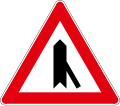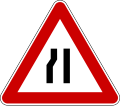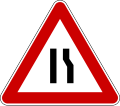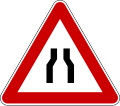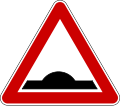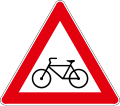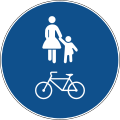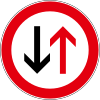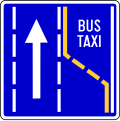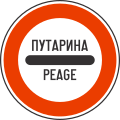Road signs in Bosnia and Herzegovina: Difference between revisions
No edit summary Tags: Visual edit Mobile edit Mobile web edit |
Tags: Mobile edit Mobile web edit |
||
| Line 124: | Line 124: | ||
File:HR road sign B48.svg|Headlamp |
File:HR road sign B48.svg|Headlamp |
||
File:HR road sign B39.svg|Winter equipment mandatory |
File:HR road sign B39.svg|Winter equipment mandatory |
||
File:Finland road sign D10-60.svg|Minimum speed limit ( |
File:Finland road sign D10-60.svg|Minimum speed limit (FBiH) |
||
File:BA road sign II-45-60.svg|Minimum speed limit (RS) |
File:BA road sign II-45-60.svg|Minimum speed limit (RS) |
||
File:HR road sign B40.svg|Bikes only |
File:HR road sign B40.svg|Bikes only |
||
Revision as of 14:09, 19 June 2024

Bosnia and Herzegovina is a signatory to the Vienna Convention on Road Signs and Signals. Therefore, road signs do not differ much from the rest of Europe, such as Croatia, Slovenia, Serbia and North Macedonia. Ministry of Transportation of Bosnia and Herzegovina regulates them. Bosnia and Herzegovina drives on the right as with the rest of Europe, except for Cyprus, Ireland, Malta and the United Kingdom. Bosnian and Herzegovinan road signs have two scripts, Latin and Cyrillic script.
The former Yugoslavia had originally signed the Vienna Convention on Road Signs and Signals on November 8, 1968 and ratified it on June 6, 1977.[1] Yugoslavia formerly used a yellow background on warning signs. After the breakup of Yugoslavia when Bosnia and Herzegovina declared its independence in 1992, the country succeeded to the Vienna Convention on January 12, 1994.
Warning signs
-
Traffic lights ahead
-
Traffic lights (horizontal) ahead
-
Roundabout ahead
-
Two-way traffic
-
Traffic queues
-
Level crossing without barriers ahead
-
Level crossing with barriers ahead
-
Tramway
-
Other danger
-
Single track level crossing
-
Multiple track level crossing
-
Intersection of crossroads of the same importance
-
Intersection with a side road at right angles
-
Joining a Side road at right angles to the left
-
Joining a Side road at Right angles to the right
-
Joining the side road at a sharp angle to the left
-
Joining the side road at a sharp angle to the right
-
Road narrows on left side
-
Road narrows on right side
-
Road narrows
-
Low-flying aircraft
-
Steep descent
-
Steep ascent
-
Bump
-
Uneven road
-
Dip
-
Curve to left
-
Curve to right
-
Double curve, first to left
-
Double curve, first to right
-
Slippery road
-
Loose gravel
-
Pedestrians
-
Children
-
Pedestrian crossing ahead
-
Cyclists
-
Warning of fire
-
Fallen rocks (left)
-
Fallen rocks (right)
-
Opening or swing bridge
-
Quayside or riverbank ahead
-
Crosswind from the right
-
Crosswind from the left
-
Rolling over or slipping of the vehicle
-
Animals
-
Wild animals
-
Tunnel
-
The bottom plate with one red line indicates a distance of 80 meters from the railway
-
The lower plate with two red lines indicates a distance of 160 m from the railway
-
The lower plate with three red lines indicates a distance of 240 m from the railway
-
Distance panels for level crossing with barriers
-
Distance panels for level crossing without barriers
-
Roadworks
-
Accident ahead
-
Children!
-
Children!
Prohibitory signs
-
All vehicles prohibition in both directions
-
No entry
-
No cars
-
No mopeds
-
No motorbikes
-
No motorbikes and cars
-
No buses
-
No bikes
-
No pedestrians
-
No trucks
-
No tractors
-
No use horns
-
Overtaking forbidden (FBiH)
-
Overtaking forbidden (RS)
-
Overtaking forbidden for trucks (FBiH)
-
Overtaking forbidden for trucks (RS)
-
No photography
-
Maximum speed limit (FBiH)
-
Maximum speed limit (RS)
-
Vehicle width limit
-
Vehicle height limit
-
Vehicles weight limit
-
Maximum length for trucks
-
Maximum weight per axle
-
Maximum weight per tandem axle
-
No vehicles carrying dangerous goods
-
No vehicles carrying dangerous Water pollutants
-
No vehicles carrying explosives
-
No handcarts
-
Minimum safe distance
-
No left turn
-
No right turn
-
No U-turn
-
No stopping
-
No parking
-
No parking at uneven days
-
No parking at even days
Mandatory signs
-
Proceed straight
-
Turn left
-
Turn right
-
Turn left ahead
-
Turn right ahead
-
Turn left or right
-
Proceed straight or turn left
-
Proceed straight or turn right
-
Pass onto left
-
Pass onto right
-
Pass on either side (FBiH)
-
Pass on either side (RS)
-
U-turn
-
Roundabout
-
Headlamp
-
Winter equipment mandatory
-
Minimum speed limit (FBiH)
-
Minimum speed limit (RS)
-
Bikes only
-
Pedestrians only
-
Rider horses only
-
Pedestrians and bikes only
-
Pedestrians and bikes only
-
Proceed straight for trucks
-
Proceed straight for vehicles carrying dangerous goods
Priority signs
-
Give way
-
Stop (FBiH)
-
Stop (RS)
-
Priority road
-
End of priority road
-
Priority for oncoming traffic
-
Priority over oncoming traffic
Guide signs
-
One-way street
-
One-way street (left)
-
One-way street (right)
-
Pedestrian crossing
-
Bicycle crossing
-
Children
-
Underground/overground passage
-
Speed bump
-
Dip
-
Living street
Indication signs
-
Water protection area (FBiH)
-
Water protection area (RS)
-
School patrol (FBiH)
-
School patrol (RS)
-
The road of movement of the vehicle to the intersection where it is forbidden to turn left
-
Dead end (FBiH)
-
Dead end (RS)
-
Restrictions in available lanes
-
Use of lanes
-
Hospital (FBiH)
-
Hospital (RS,1)
-
Hospital (RS,2)
-
Police (FBiH)
-
Police (RS,1)
-
Police (RS,2)
-
First aid station
-
Use of lanes at an intersection (FBiH)
-
Use of lanes at an intersection (RS)
-
Use of lanes at an intersection for bicycles
-
Lane for buses and taxis (FBiH)
-
Lane for buses and taxis (RS)
-
End of lane for buses and taxis (FBiH)
-
End of lane for buses and taxis (RS)
-
Increased lane (FBiH)
-
Incerased lane (RS)
-
Lane reduction (FBiH)
-
Lane reduction (RS)
-
Speed control
-
Traffic control
-
Overtaking prohibition ends (FBiH)
-
Overtaking prohibition ends (RS)
-
Overtaking prohibiton for trucks ends (FBiH)
-
Overtaking prohibition for trucks ends (RS)
-
Ban on honking ends
-
End of previous prohibitions
-
Minimum speed limit ends (FBiH)
-
Minimum speed limit ends (RS)
-
Maximum speed limit ends (FBiH)
-
Maximum speed limit ends (RS)
-
End of mandatory winter tyres or chains for tyres
-
End of headlight obligation
-
Horse track ends
-
End of bike only
-
End of pedestrians only
-
Footpath ends
-
Footpath ends
-
Pedestrian and bicycle path end
-
End of living street
-
Speed limit zone
-
End of speed limit zone
-
No park zone
-
End of no park zone
-
Pedestrian zone
-
End of pedestrian zone
-
Recommended speed limit (FBiH)
-
Recommended speed limit (RS)
-
End of recommended speed limit (FBiH)
-
End of recommended speed limit (RS)
-
Parking zone
-
Parking garage
-
Parking time limit (FBiH)
-
Parking time limit (RS)
-
River
-
Bridge
-
Wildlife crossing
-
Signpost
-
Built-up area
-
End of built-up area
-
Altitude of the pass
-
Tunnel
-
Electric vehicle charging station (FBiH)
-
Electric vehicle charging station (RS)
-
Road information radio
-
Bus stop
-
Taxi stand
-
Tram stop
-
Airport
-
Port
-
Petrol station
-
Hotel
-
Public toilet
-
Fire extinguisher
-
Telephone
-
Information center
-
Cafe shop
-
Restaurant shop
-
Land for caravans
-
Land for RVs
-
Self water discharge
-
Camping area
-
Car wash
-
Tire dealer
-
Road assistance
-
Tool service Area
-
Drinking water
-
Vila
-
Park
-
Street sign
-
Manual traffic control (FBiH)
-
Manual traffic control (RS)
-
Chevrons
-
Chevrons
-
Chevrons
-
Chevrons
Highway and expressway signs
-
Motorway
-
Motorway ends
-
Motorway signpost
-
Motorway signpost
-
Notice of exit along the freeway
-
Notice of exit for freeway junction
-
Third lane
-
End of third lane
-
Exit sign
-
Rest stop
-
Motorway information
-
River
-
Notice of toll payment along the motorway
-
Notice of toll payment along the motorway
-
International road number
-
Emergency exit
-
Emergency exit
-
Highway number
-
Mileage on the highway
-
Motorized vehicles only
-
End of motorized vehicles only
-
Emergency stop
-
Emergency stop
-
Wrong way
-
Expressway road number
-
Progressive mileage on the expressway
-
Built-up area on a highway
-
End of built-up area on a highway
Direction signs
-
Highway signpost
-
Pre-signaling of directions on the motorway
-
Pre-signaling of directions on the extra-urban road
-
Pre-signaling of directions on the extra-urban road
-
Pre-signposting of directions on an extra-urban road at an intersection with a circle road
-
Pre-signaling of directions on the Expressway
-
Pre-signaling of directions on the extra-urban road
-
Signpost for secondary road
-
Confirmation signal for extra-urban roads
Border crossing signs
-
Border crossing
-
National car sign
-
National speed limits
Checkpoint signs
-
Customs
-
Police
-
Toll (FBiH)
-
Toll (RS)
References
- ^ "United Nations Treaty Collection". treaties.un.org. Retrieved 2023-12-08.

















